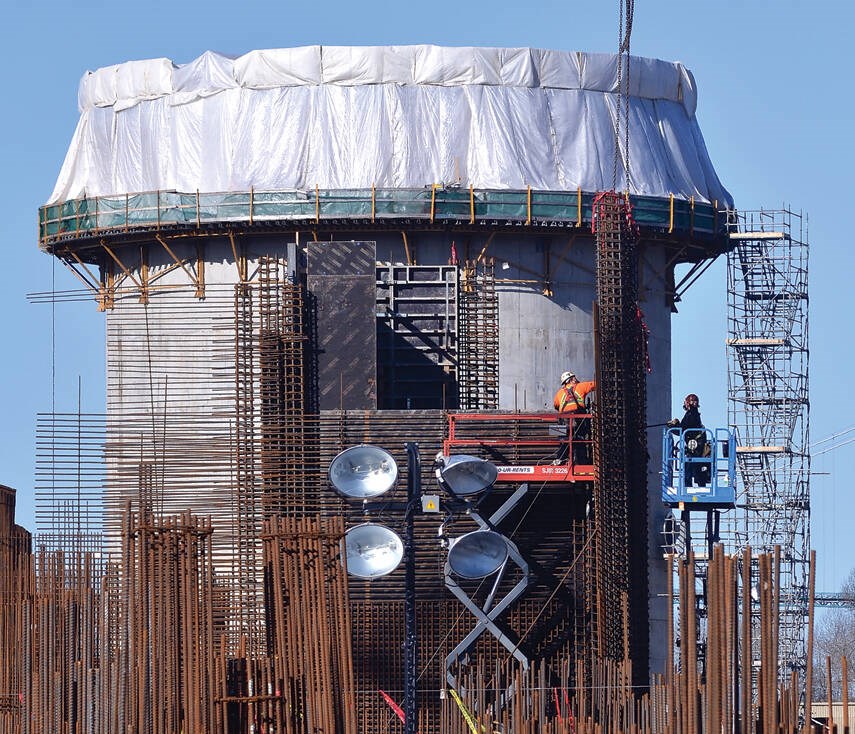The North Shore won’t be getting a lot of help from the rest of Metro Vancouver when it comes to paying for almost $3 billion in cost overruns on the problem-plagued North Shore sewage treatment plant.
In a series of votes Friday morning, directors of Metro Vancouver’s regional board rejected a request from North Shore board members to share significant costs of the sewage plant overrun.
Instead, directors approved a plan that will see sewage costs for North Shore taxpayers go up by $590 a year for the next 30 years (that's on top of an average of $484 of current sewage costs). Costs to other Metro communities will rise by between $80 and $150 annually.
Friday’s meeting was the third special budget meeting directors have held to grapple with how to deal with the unprecedented $2.86 billion cost overrun on the sewage treatment plant. Politicians considered a series of options to spread the tax burden across the region.
District of North Vancouver director Lisa Muri urged board members to consider an option that would see sewage costs to North Shore households rise by $185 annually, rather than the $725 a year projected under the current funding formula. Under that scenario, additional costs for other areas would go up by $40 more than the $80 to $140 cost increase projected under the current funding formula.
Muri told directors that would allow “a manageable increase for the extraordinary cost” of the sewage plant for North Shore households, adding, “It is inconceivable to us that the burden of this project will lay the largest financial impact on the smallest sewage region in Metro Vancouver.”
City of North Vancouver Mayor Linda Buchanan told the board while the North Shore was prepared to pay original costs of the sewage plant – even as those budgets rose – there was no way to absorb an unexpected $2.86 billion into small municipal budgets.
“We represent seven per cent of Metro, but will take on almost 50 per cent of these costs, which is an overrun,” said Buchanan. “This is going to be too much for us to absorb.”
West Vancouver Mayor Mark Sager said even with help from other Metro communities, North Shore taxpayers would still be paying twice as much for sewage as most other Metro communities.
A number of other politicians – including directors from the City of Vancouver – supported the request to spread the costs out.
Director Lisa Dominato described the cost overrun as unprecedented. “We need to share that burden,” she said.
“When your neighbours are in trouble you hope that you rush in to help. And they really are in trouble,” said Vancouver director Sarah Kirby-Yung.
Maple Ridge director Dan Ruimy added the cost overruns are not the fault of the North Shore municipalities.
“It could have been any one of us,” he said. “I may not be using the washroom in North Van, but the reality is that sewage goes into our oceans and it affects us all. I don’t want to support this but I don’t think I have a choice.”
That perspective wasn’t shared by a number of other directors, however, with Gordon Hepner of Surrey pointing out the North Shore didn’t step in to help with the costs of building other sewage plants.
Mayor Brad West of Port Coquitlam said the North Shore proposal would shift 88 per cent of the project costs to the rest of the region, which wouldn’t be fair.
Muri tried to convince fellow directors to change their minds.
“This is the most serious issue the North Shore has ever faced in its history,” she said. “We’re talking about a project that started off at $600 million and it went sideways. It went significantly sideways.”
In a series of weighted votes, however, the majority of the board rejected options for more significant sharing of the costs.
Under the scenario adopted by the board, North Shore taxpayers will still be on the hook for 37 per cent of the almost $2.8 billion cost of the plant cost overrun while the rest of the region will pick up 63 per cent of the tab. The North Shore’s annual cost increase will be phased in over a five-year period.
Those costs are on top of annual costs of $464 that North Shore taxpayers already pay for sewage treatment – an amount that is already the highest in the region.
Directors have also indicated they are willing to look at a different funding formula in future, which could combine all of Metro Vancouver into a single sewage area for the purposes of paying for large infrastructure projects.
Metro Vancouver Commissioner Jerry Dobrovolny has warned, however, that process would likely take a couple a years to complete and would likely be “a complex and difficult discussion.”


